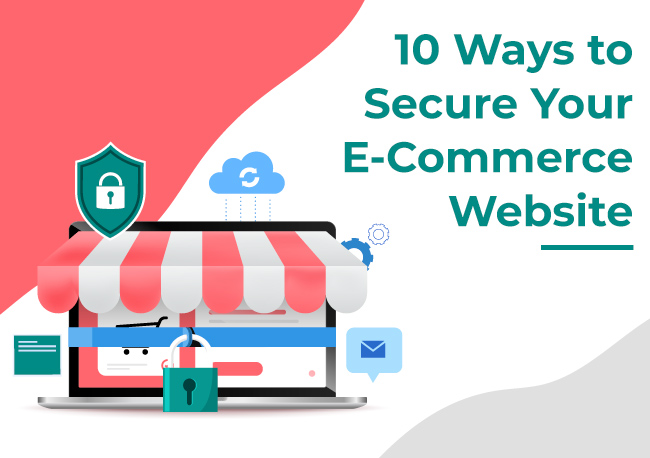Security has been greatest priority when running an online business. It has been the basic piece of any transaction happening on the web. All of us are aware of the level of digital frauds that can put you out of business, if not prevented.
Hackers uses malwares to dig out the sensitive data from different databases and people. It is common to get into trouble like transactional fraud, unethical hacking, etc. So how to secure your ecommerce website from such activities?
You obviously have an ecommerce website and have to secure your website for your customers. You should always be aware of how you can protect your website from ecommerce threats and prepare for them. There are enough reasons to keep your customers’ details safe to use and secure. By safe to use, we mean doing your best to safeguard your customers’ data.
As you know, prevention is better than cure. To prevent your business from falling victim to hackers and online fraud, create a perception of security. The best approach is to invest in ecommerce security as much as possible. There are security benefits by taking this approach. Explore pro tips to secure your ecommerce website from online attacks.
What is E-commerce Website Security?
Ecommerce website security is essential if you are to make it in the industry. It has a variety of activities and measures that protect your website from threats and keep your online transaction safe.
Your online store represents a complex system where numerous components have to cooperate with one another – your server, your web apps, users, and network connection. The necessary fact is that all of the components must be protected from any form of online breach.
Only then will this function without any hindrance. A business should, therefore, employ rock-solid ecommerce security protocols and measures. It is a ground rule that assures protected transactions consists of protocols that shield people who engage in online selling and buying goods and services.
It is important to boost your customers’ trust by putting basic ecommerce website security.
Also Read: A Useful Guide To Building An Ecommerce Website From Scratch
10 Pro Tips to secure your website
When a website gets hacked, it tends to leave visitors petrified. The best approach in online security is be proactive because it will save you a lot of time and headache down the road. So how can you do this? You need to just follow the tips to ensure maximum security for your ecommerce website.
1. Reliable web hosting service
Choose the one that has automatic updates and backup facilities. You have to ensure that the web hosts provide high security and are perfectly capable of meeting all your requirements. It should be operational 24/7 and have maximum uptime.
You should check for security certifications that the web host is certified with. Reliable web hosting providers tend to be transparent about their activities and protect your website from any attacks or hacks. You essentially want a plan that gives you total control over your server.
Also Read: 5 Things Small Business Should Know About Web Hosting
2. Secured Ecommerce platform
When creating your website, you must ensure it is secure at any cost. The payment gateway you use should be of the highest quality in terms of security of the sensitive data. It should release security patches and tell customers about shipping methods.
This is the best way to protect your customers and own business from fraud. You will be required to encrypt all the data and communication with the bank and take all the necessary safety measures to keep that information protected.
If you use big and reputable payment gateway, you know that security has been taken care off. These companies have the right resources and knowledge to keep and maintain secure payment systems. They also offer automated fraud protection.
Also Read: 7 Best CMS For Building An ECommerce Website
3. Use a strong password
Unauthorized access is potentially a major problem for anyone, which may result into loosing of valuable data like bank account details, credit card details, etc. Most of your online accounts are protected by username and password combination.
One of the best ways is to create a tough password using uppercase and lowercase alphabets, numbers, and symbols. This diminishes the risk of someone guessing your password.
For those who don’t know, password security is the best practice to follow to protect your website from any kind of online fraud. You should implement the use of strong passwords because it is the best way to generate and protect your website.
Also Read: Best Practices To Secure Your Website
4. Stay Updated
It is important to update security tools and plugins regularly. Keeping your software up to date is a top-tier method to ensure it remains secure. Mostly people think about updates in terms of functionality.CMS, plugins, extensions, etc., should be run on the latest versions at all times.
Updates are so imperative to fix, determine security bugs and implement safer practices. Make sure to always update your website regularly with new patches and features that can make them more secure than before. The foremost and common tip is always to back up your data.
Also Read: Complete Guide To The Content Management System
5. Implement SSL certificate
SSL certificates ensure that online user data is kept safe when making purchases. SSL is a digital certificate that establishes a secure connection between servers and users. This is obligatory for any website receiving sensitive user information such as credit card details.
This ensures that all the delicate data and details will be sent across the network in encrypted form. A secure connection means buyers or customers should see “HTTPS” before the URL while they are logging in.
Also Read: 9 Types Of SSL Certificates – Make The Right Choice
6. E-commerce security plugins
Security plugins are a simple way to secure your website. They are very popular among the platform’s users. They provide protection against bad bots and other severe attacks. One of the most secure, easy to apply, and feature-rich is security plugins. It helps to secure your website automatically. You can implement many of the features such plugins offer manually.
All-in-one security is much more convenient. Reliable, well-developed security plugins will help protect your website against hackers.
Also Read: Best WordPress Security Plugins In 2022 (Paid+Free)
7. Consider two-factor authentication
Strong authentication is necessary to increase your security for accounts and online services. It provides a higher level of security than single-factor authentication.
It adds an additional layer of security to the authentication process by making it hard for hackers to access any delicate information of the customers. Online service providers have been increasingly using two-factor authentication to protect their users’ credentials from being misused by hackers.
An important aspect of two-factor authentication is ensuring the authenticated user is given access to all resources the user is approved for.
An important aspect of two-factor authentication is ensuring the authenticated user is given access to all resources the user is approved for.
8. Create a Backup of your Data
Backup is like a security guard to your website. If you don’t opt for it, your assets are gone. Just imagine how difficult it is to build the website again from scratch? A backup is not successful until you’ve restored it and ensured all of the data is present.
If done manually, this method could be tedious and prone to mistakes. An automatic restoration is far superior. Do it manually or automatically but make it mandatory to take a backup of it.
Also Read: Top 5 Reasons Business Owners Need Website Backup
9. Avoid Storing sensitive User Data
The number one rule should be only to gather the information that is truly necessary for a seamless transaction. Top businesses like Amazon and Flipkart invest millions in security. As one of the sensitive types of data, customer privacy is extremely important for the e-commerce industry.
Businesses collect this information from their customers to understand how they feel about the products and keep in touch with them about the future product launch. Today’s digital worlds face a serious threat in the form of cyber-attacks. Your users’ valuable personal and financial information should be kept secure and off of web servers because cybercriminals and hackers can’t take what isn’t there.
If you must save a particular piece of data, ensure it is safeguarded and kept in an online storage facility that adheres to industry best practices for data security.
Also Read: Is Investing In Domain Name Privacy Protection Necessary?
10. Payment Gateway security
Payment gateway has never been so convenient. It is merchant services that process credit card payments for ecommerce websites that check the validity of the customers’ information and plays a vital role in cracking down on fraud.
Encrypting data is the main method that payment gateways use to secure sensitive transaction data. Having the right payment methods on your side is the first step to ensuring the safety and security of your payment transaction.
Conclusion
In the world of ecommerce, it is crucial to take security measures seriously. In Conclusion, It is a smart idea to safeguard your website as soon as possible. keeping your website secure is important for both your customers and your business.
You have to ensure that the security of its user is guaranteed, which entails credit card details and other financial records allocated to your site. The goal is to boost the level of trust and confidence customers have on your site.
Eliminate fraud and improve your security with the tips provided in this blog post will help you better understand what security measures you can practice to secure your ecommerce website.




